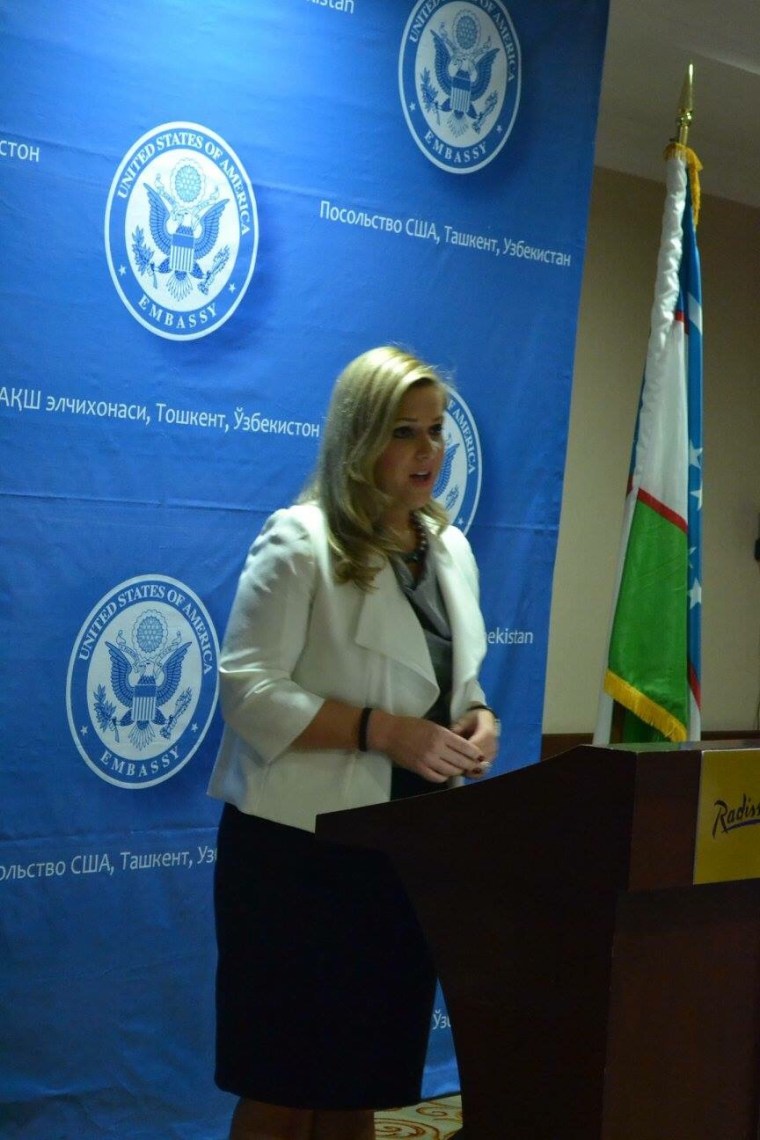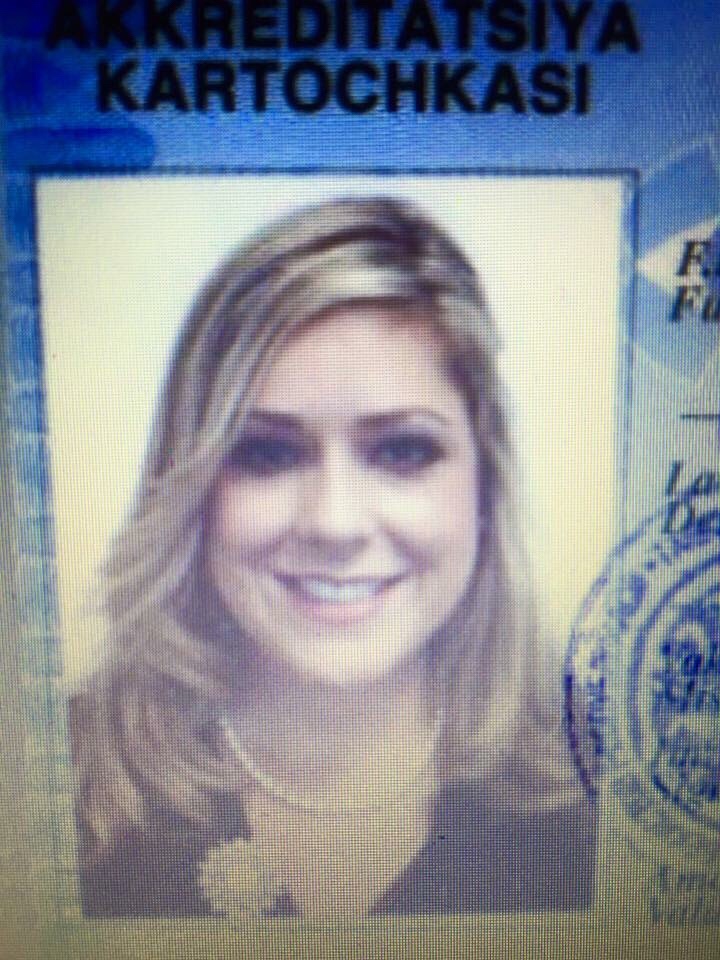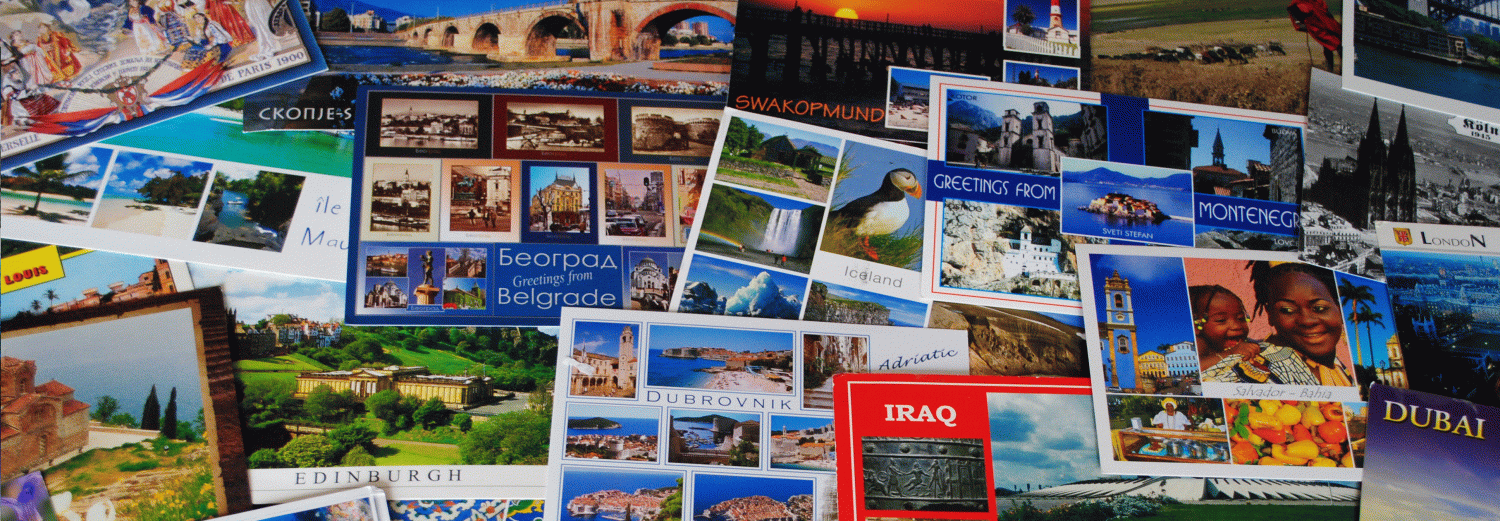At least a couple of times a month, the Collecting Postcards blog receives questions via social media or email. Although I always answer readers directly, I have also wanted to address repeat questions more broadly by turning them into blog topics. I tried this in August 2015 with a feature I called “Your Questions Answered,” but lapsed in keeping it going. I’m going to try to relaunch it, so here are a few recent questions I’ve received: about access to American “stuff” while overseas, coping with distance from loved ones, making home wherever you lay your head, and balancing official duties with personal beliefs. Go ahead, ask a diplomat!
Q: What sweet deals do you get working for the U.S. in foreign countries? Easy access to peanut butter? A recreated Target in the basement of the embassy?
A: This question made me laugh, because it came from someone I know. In fact, this person and I served in the same Peace Corps Macedonia program. He has been traveling and living abroad for years post-service as a teacher and expat, and so even though the question was proffered in jest, there is an element of serious inquiry there that I can relate to.
During my time as a Peace Corps Volunteer (and I presume this is true for most PCVs), “getting American stuff” was a constant challenge and topic of discussion. When you serve in Peace Corps, “deprivation” from the conveniences of home is a normal expectation and might even be part of your motivation to go help others while living a more humble life, leaving behind the accoutrements of the first world.
You soon come to terms with having less. Between mail theft, distance, lack of funds/PX/commissary privileges, host country conditions, and a variety of other factors, you’re more or less limited to the local market. Unlike PCVs, diplomats earn salaries, have diplomatic pouch and APO/DPO privileges, and shipping allowances for household goods (and depending on the post, consumables). So in my experience, diplomats have more access to things – and people who have things – than do PCVs. It comes with the territory.

Consumables arrive in Tashkent! 2016
The good news is that while abroad, no matter the auspices, missing certain things from home is countered by choice and opportunity. You have greatly enriched your life by making the decision to serve and experience life in a different part of the world. You are also traveling more, and – at least, in theory – gaining new favorite things along the way.
I have lived abroad four separate times, and each time I returned to the U.S. I longed for a favorite dish or place that I had grown to love abroad. It took some time for me to realize that the more I’m ranting about the lack of burritos, or whatever, I’m forgetting to appreciate what I do have and running the risk of missing out on new things altogether. I mean this to be more practical than philosophical – the U.S. and all its stuff isn’t going anywhere.
But none of this means that even the most resilient expats don’t dream of a big jar of peanut butter or a giant bowl of nachos now and again. Or that we don’t relish the challenge of planning ahead and gathering the right ingredients to host a taco night or wine and cheese party for our amazed expat friends – something that would hardly impress stateside, but is a major morale boost while far from home.
The larger topic for discussion here is about figuring out what effect access to “comfort” has on your individual happiness overseas. I’m not gonna lie – when we served our first diplomatic tour in Uzbekistan, we placed our orders through the commissary, Ramstein AFB, and Peter Justesen for frozen food, liquor, and specialty items like everyone else. It made life a little more comfortable, and any diplomat who says they haven’t packed bacon, cheese, avocados, Trader Joe’s cookies, or something before an international flight is probably a poseur.
However, treats are for once in a while. My balance is to savor and appreciate the bits of home I can, and for the rest of the time focus on the present and enjoy great local things. If you (or your immediate family) simply cannot comprehend a long-term trade of on-demand Target runs, American food, and all the trappings of U.S. life for the beckoning world’s other adventures, this lifestyle is probably not for you.
Q: How is it moving around the globe? I LOVE to travel and do so at every opportunity but have that fear that I’ll miss home too much. How have you been able to handle the lifestyle? Does it seem sustainable? Do you ever feel “at home” at any location? How often have you been home?
A: This was a question I received from someone who is considering joining the Foreign Service, but has concerns about homesickness and how sustainable it actually is to spend the majority of one’s career abroad. Her question has multiple parts, so I’m going to break it down: how have I handled the distance from home for prolonged periods of time, whether my homes abroad actually feel like home, and how often I return to the U.S.
Handling the distance. Sometimes I feel like I’m not the best person to answer questions about this, so let me preface my answer with a disclaimer: what works for me may not work for others.
When I graduated from high school and moved eight hours south to San Diego for college, my hometown friends commented, “Dude, that’s hella far.” I responded, “No way, it’s within the same state.” Moving from San Diego to the Balkans for Peace Corps garnered further incredulity, and when I went to Australia for grad school my parents commented that I’d gone so far I was on the way back. When I did return stateside, it was to spend nearly nine years in the DC area – clear across the country from my CA-based family.
On the one hand, it meant that I was not able to be there as much as I would have liked. On the other hand, I had spent $70K putting myself through college and grad school and I just knew that it was my time to be in Washington, To Make Something of Myself. I couldn’t do that in Northern California’s gold country. My family also understood this. I think they were just glad I was back in the U.S. where they could call me for free!
So my ability to cope with the distance now is eased by my perception that I remain close with my loved ones, even though I am far away, and that home will always be there. Be realistic about whether and to what extent you could adopt this mentality. If you cannot, at least for most of the time, you are in for a rough ride. You can grow into it, as it were; at least in my experience, as I suffered from searing, debilitating homesickness my first stint living overseas, and never since.
The willingness and ability to move around the globe is a major reason that this career either suits someone, or it doesn’t. The State Department asks us to serve as “worldwide available,” and they mean it. Although I note how well it suits can vary drastically at different points in our individual lives and careers, given our own family needs for education, medical care, elder care, and other circumstances. There is also a huge difference between traveling and actually coping with the day-to-day realities living and working in foreign countries for years on end. Just because you went somewhere once for four days doesn’t mean it would be an awesome place to serve. Even first world countries that at-a-glance may appear very similar to the U.S. can function very differently and you can find yourself in major unexpected culture shock.
I think all diplomats miss home at some point, but I also think that most of us are further along the continuum of being able to cope well with it. Most of us pursued this career with our eyes wide open in that regard. We are patriots, and although we love our country, we don’t necessarily have – or even want – to be there every day.

Here we go! Headed to first post in May 2015
I was never going to be a person that stayed in – or permanently returned to – my hometown as an adult. That doesn’t mean that I am not close with my family. My immediate family is wonderful, low maintenance with communication expectations, and expresses a lot of love. I cannot thank my parents and brother enough for the unconditional love and support they give to me – not to mention the interest in all the details of my unorthodox life even when they can’t relate – which buoys me and keeps me strong.
But there may be people in your life who get disappointed or even angry with you for making the choice to have a career and life overseas. It is so far out of the norm for most Americans, that some will be jealous, or take your “leaving” as an affront. Sounds weird, but you would be surprised how many of us have experienced petty, entitled demands to take on others’ financial responsibilities, or snide, “must be nice” type comments about our lifestyle. Not everyone will get it, or value what you’re doing and the sacrifice it takes, and that’s all right. Your life is about what you choose, and as you get older and everyone buckles down and expends energy into their own pursuits – work, hobbies, child-rearing – you have to forge your own life in the best way you know how.
So if ultimately you join the FS and quit, or alternate domestic tours with tours a direct flight away, or live in back-to-back hardship posts to earn extra money, I recommend you spend some time thinking about and feeling what you need to cope with the distance. Reevaluate your position from time to time. Be kind to yourself. A lot will depend on your perceptions of time and distance.
Ask for support when you need it. Ignore the haters and people who are too insecure to be happy for you. FaceTime with home and ask how people are doing. Make the effort to share your life with people who aren’t with you every day. Teach the kids in your family that the world is full of choices. Be realistic in assessing whether this is worth it to you, and keep it an open, ongoing conversation with your partner (if you have one).
Settling in matters. This is your life! My husband and I have tried hard to ignore the impermanence of the circumstances and live fully in each place. We decorate our house and unpack as soon as we can. We make friends. We register our car, find a shoe repair shop, learn the culture, learn our way around. Life isn’t on pause, and there is no someday. Life is now – even with government-issue furniture and walls you can’t paint! It may not be everything you want, but you have to own it and make it yours.

Our house in Uzbekistan, 2015-2017
Some of the most successful officers I’ve seen come to a new post and hit the ground running – learning their job, everyone’s names, and all the local tips as soon as they can, and even traveling out of town. It took me a while to understand that they aren’t just “bearing” the transience; they’re embracing it fully and feeding on it. Although sometimes it can take a frustratingly long time for someone like me who wants everything just so to feel “settled,” making the effort really helps everything else come together. And if you’re overseas with family, you have an escape to the office every day, but your family needs the sanctuary of a proper, put-together home. Make it a team effort.
My best advice is don’t make the perfect the enemy of the good. Don’t not unpack. Hang things, even though you will have to take them down in two or three years. Step fully into the space and make it yours, because the million milestones and mundane moments that happen within these walls will comprise your life.
You can go home again, kind of. I usually only go to the U.S. once a year, or once every other year. Even when I lived in DC, I didn’t usually make it to the west coast more than once or twice a year anyway, due to money and work constraints. The sometimes-sadness of my being away hits me in waves: a picture of my niece or stepdaughters who are growing up so fast, a wedding invitation, my parents getting older. But for the most part, I am OK. I have received visitors in most places I’ve lived and it is exciting to show friends and family what I do. My mom’s trip to Uzbekistan in 2016 was probably one of the scariest, most exhilarating, most interesting, and most profound experiences I could have shared with her. She got a firsthand glimpse of what we dealt with daily when she saw the life and career, as well as the obstacles we face, up close.
Some officers go home more often, or do a few domestic tours. Certain hardship posts allow rest and recuperation (R&R) travel home once, twice, or even three times a year, while at posts in more developed countries a trip home will be out of pocket for the officer. Some officers who, say, have elderly parents may try to take posts in Latin America or Canada so they can be closer to help out. Basically, going home really depends on your individual circumstances and priorities.

Last day at U.S. Embassy Tashkent, 5/31/17
For me, the benefits of this job offer me something that life based in the U.S. does not. And I believe you have to leave a place behind before you can truly appreciate the role it played in shaping who you are. If I never leave, how will I miss it?
Q: I’d be curious to hear how foreign service folks balance their personal beliefs/political leanings with their roles and responsibilities of representing the country.
A: This can be a tough one. When we join the Foreign Service, we take an oath of office to support the Constitution – not the president, secretary of state, or a particular political party. We are public servants, irrespective of which administration is in office. Like a lawyer representing a client, we don’t speak for ourselves. When I sit on a panel or explain our policies to foreign interlocutors, the placard in front of me doesn’t have my name on it: it says “United States.” And when I am delivering a policy démarche to a host government official, my personal feelings are of no consequence and don’t enter the discussion.
But every diplomat knows that over the course of a career, there are likely to be times when we don’t agree with U.S. policy. Just because we have joined the Foreign Service doesn’t mean we’ve surrendered the right to hold our own political opinions. In fact, in many cases we were selected during our candidacies because we challenge the status quo, are self-starters, problem-solvers, and speak with conviction. You don’t have to abandon your personal beliefs, but you do need to have a good sense of when they are – and aren’t – appropriate to share while doing your job. It really comes down to professionalism and how you handle situations as a representative of the U.S. government.

Speaking at a U.S. citizen town hall, 9/28/15
A diplomat has to know and understand his or her obligations depending on the audience. With your friends and family, you’re probably going to express your personal thoughts and opinions, and maybe where they differ from policy and why. With a public audience or your host country counterparts, you’re going to tow the line and explain U.S. policies. If you’re adjudicating visas, immigration law rather than your own personal feelings will guide your decision-making. If you’re overseas and reporting back to Washington, you’re going to explain everything you can about the host country’s laws, attitudes, perceptions, objectives, and so on to inform and shape U.S. policy. Internally diplomats have an obligation to “tell it like it is” and provide the value-add expected from diplomats in the field.
Although navigating these different contexts requires nuanced judgment, the commonality is the opportunity to listen, understand, and explain. To absorb. To know when to be neutral, and when and how to disagree. To be an honest broker. To be a problem-solver.
To understand success depends as much on your ability to persuade and cooperate with your American colleagues as it does with your host country colleagues. And to understand that diplomacy is not about being “nice” – indeed, you will tell people in professional settings things they do not like and sometimes they will get very mad. And that is OK.
I find the following passage from the classic Career Diplomacy: Life and Work in the U.S. Foreign Service by Harry Kopp and Charles Gillespie (chapter 6, “Politics and Professionalism”) particularly illuminating:
Tension between the professional foreign service and its political masters is inevitable. It can be invigorating or corrosive. The professionals are proud of their knowledge, skill, and experience, but it’s the elected officials and those they appoint who set the policies and vote the taxes and budgets to carry them out. Foreign service professionals must give effect to the policies of the administration and the laws of the land, even as the policies change and the laws are revised. To maintain the flexibility they need, many professionals try to hold themselves above politics. If they succeed, they succeed just barely, for try as they may they are in politics up to their eyeballs.
There is no way around it. As members of the foreign service advance in their careers, they take on jobs of increasing responsibility and public presence. Whatever their position in closed-door debates, when [they] deal with foreign officials or the public, they have to follow the official line and defend it vigorously.”
So what happens when an American diplomat just cannot get behind the official line on an issue? Is there anything to be done other than resign from your dream job? In fact, there is. The dissent channel is the way to register official objections directly to Washington without having to go through your chain of command. The dissent channel has been used to register disagreement on policy from Vietnam to Iraq and beyond. And those who use the dissent channel are protected from retaliation at all levels.
I have served in the federal government under three different presidential administrations so far, and as an FSO under two. All three were different, and all three made some policy decisions that I personally supported, and some I did not. However, I never felt like I could not carry out my duties because of those feelings.
Also, unlike some of my colleagues, I simply do not discuss my personal politics on social media or in the workplace and for me, that is the right choice, although I understand and respect that it does not work for all. At the end of the day, I believe in our country and what it stands for even during challenging political times. Call me the eternal optimist.
Ultimately, each diplomat has to make the decision on how far he or she is willing to go in supporting policies they personally don’t agree with. I think most of us feel that if the day came where we could no longer conduct our professional duties in good conscience, we would resign. And you may have seen a rash of this in the press during the last year.

My Uzbek diplomatic accreditation, 2015
For more on this topic and in addition to Career Diplomacy, I recommend the essay “Truth or Policy: Speaking Your Mind in the Foreign Service” by Justin Friedman (Realities of Foreign Service Life, Volume 2).
In the next installation of “Your Questions Answered,” I will talk about “a day in the life” of my current job, and the Hatch Act, the rules that govern federal employees’ use of social media expression.
Don’t forget, your questions are welcome at askcollectingpostcards@gmail.com or @PennyPostcard on Twitter. It may take me some time, but I do read and respond to everything I receive.

Reblogged this on Raised in the Foreign Service and commented:
This young Foreign Service Officer expresses beautifully the positive attitude with which both of my parents approached Dad’s 20-year career with the United States Information Agency.
LikeLiked by 1 person
This was awesome to read. I am currently going back to school to become a FSO which I’ve always wanted!!! So great to read!
LikeLiked by 1 person
Thanks for your comment! Any particular specialist field of expertise or generalist cone that interests you?
LikeLike
You’re welcome! and yes I am very interested in the political track, but I heard that in the beginning for your first tour everyone is a generalist, but politics is what interests me the most.
LikeLiked by 1 person
Most non-consular coned generalists are supposed to do a year of consular work, but the reality is that most do 2-4
years of consular work (1-2 tours) before moving on to an in-cone assignment. But like everything in the FS – it depends. 🙂
LikeLike
That’s very helpful thank you! Consular work from what i read and know is good too. I feel like I’m the FS it depends is very common lol
LikeLiked by 1 person